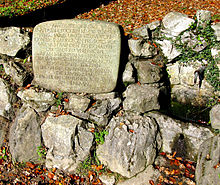Battle at Günterstal
| date | April 23, 1848 |
|---|---|
| place | Jägerbrunnen near Günterstal |
| output |
| Parties to the conflict | |
|---|---|
| Commander | |
| losses | |
|
at least 20 dead |
at least 3 dead |
Heckerzug (April 13-27 , 1848): Scheideck - Günterstal - Freiburg - Dossenbach
Struve Putsch (September 21-25, 1848): Staufen
Baden military uprising (May 9 to July 23, 1849): Heppenheim - Weinheim - Wald-Michelbach - Ludwigshafen - Käfertal - Ladenburg I - Hirschhorn - Waghäusel - Ladenburg II - Sinsheim - Ubstadt - Durlach - Gernsbach - Rastatt
The battle near Günterstal took place on April 23, 1848 during the Baden Revolution at Jägerbrunnen not far from the village of Günterstal . Here kept government troops a vanguard of under Franz Sigel city Freiburg advancing guerrillas on.
prehistory
During the Baden Revolution , following the defeat of Friedrich Hecker near Kandern , the government had gathered its own and Hessian troops around Freiburg to cleanse the city of the rebels. On April 22, 1848, around 1,500 militants barricaded themselves in Freiburg, who were urgently waiting for their relief from the announced 5,000 men who were advancing towards Freiburg from the direction of Horben under Franz Sigel's command . In order to see what happened to these troops, the insurgents who were practically locked up sent a delegation under Hermann Mors to the direction of Horben. The delegation finally came across Sigel's vanguard of around 300 men under Gustav Struve , who reported: The band of Freiburgers asked us to move on Freiburg as quickly as possible by baring the city itself from enemy troops, but those in the vicinity be favorably disposed towards the people. In general, the Freiburgers presented the matter to us as if it were only a matter of taking possession of the city. In the absence of Sigel it was unanimously of the opinion that it could not be waited any longer, all the less since Sigel, since he was mounted, could easily overtake the column and take over command.
The battle
Impressed by the requests of the Freiburg delegation and spurred on by ambition, Struve rushed forward with his small team against Sigel's express order. Sigel reports on Struve going it alone: Without taking the necessary precautionary measures, they descended into the valley and to the village of Günthersthal and moved in a column along the valley towards Freiburg. But when they arrived at the mouth of the valley, they suddenly met - as was to be foreseen again - the enemy who had positioned themselves there and received them after a brief parliamentary session with artillery and infantry. As was clearly to be foreseen after the battle of Kandern and the behavior of the royalists, ... the commanding officer did not enter into any negotiations, but gave the answer to the former Baden artillery officer Kunzer, who asked him whether Struve could speak a few words: "Away, away you dog". Kunzer addressed the artillery crew with the words: "You will not shoot, your fathers and brothers are over there," whereupon the commander gave the battalion standing next to him the order to fire. With the exclamation "Father and Fratricide!" Kunzer rode back. His horse received a minor wound from the shots that were forwarded .
The men in the front line, armed only with scythes, panicked after the first volley of grapeshots and ran away, some tossing their scythes away. Sigel, alarmed by the fire of rifles and grapes, came rushing down from Horben to Günterstal with a troop just in time and repulsed the government troops. The battle lasted from three thirty in the afternoon to seven in the evening. Much blood flowed on both sides. At least 20 irregulars and three soldiers lost their lives at the Jägerbrunnen. The 2nd Grand Ducal Hessian Regiment also fought on the side of the Baden government troops .
Commemoration
Until April 21, 2003, there was only one memorial stone at the Jägerbrunnen that soldiers of the government troops had placed on their fallen comrades.
On Easter Monday 2003, an initiative to commemorate the Baden Revolution unveiled a memorial stone on the same spot for the twenty rioters who died there in battle with government troops in the fight for freedom and democracy.
literature
- F. Hecker: The survey of the people in Baden for the German Republic in spring 1848 , printed by JC Schadelitz, Basel 1849 online in the Google book search
- Karin Groll: A missed opportunity? The battle near Günterstal in eyewitness reports and memories . In: Badische Heimat, Volume 70, 1990, pp. 567-576
Web links
Individual evidence
- ^ Gustav Struve: History of the three popular surveys in Baden , Jenni, Bern 1849, p. 75/76 online on Google digitized
- ^ Franz Sigel : Experiences during the first elevation of the German republicans in April 1848. In: Friedrich Hecker: The elevation of the people in Baden for the German republic in the spring of 1848 , Basel 1849, p. 116 Google digitized
- ^ Heinz Siebold: 1848 - an uprising for freedom and human rights , in 1000 years Wiehre; An almanac, page 140, Promo Verlag, Freiburg 2008
- ^ See Wilhelm Bigge: History of the Kaiser Wilhelm Infantry Regiment (2nd Grand Ducal Hessian) No. 116 , Berlin 1903, pp. 252-253 Internet Archive
Coordinates: 47 ° 58 '15.4 " N , 7 ° 51' 7.3" E

